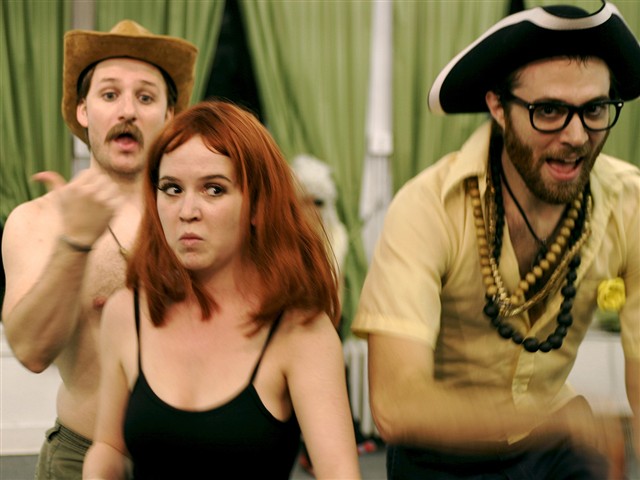No Dice
Guest performance of the Nature Theater of Oklahoma from NYC on November 25, 2009, at the HAU3 in Berlin
Away with naturalism! appears to be the current motto in contemporary U.S. theater. Young Jean Lee’s celebrated Shipment utilizes an intricate composition of four parts to trick the audience and push our nose at our own patterns of perception.
Even before the performance of No Dice begins, things get cheap and pompless: the makers of the Nature Theater of Oklahoma, Liška and Copper, give out cheap soda pops and spread fat peanut butter on slices of white bread. Surely there are pragmatic reasons for this as well, because four hours in the theatre are long. The lobby bar of the HAU (unfortunately) remains closed, however, so I suspect there is some conceptual consequence at work here.
The Nature Theater’s dramaturgy in No Dice is a playful set of rules. The production neglects anything like the development of a story or characters. Moreover: we hear several passages twice, while the dialogue is passed on between the actors.
I ask Kelly Copper und Pavol Liška: Why this title?
Pavol: In our previous production, Poetics, we had been working with everyday gestures, which we then selected arbitrarily by means of dice and subsequently choreographed. In No Dice, we developed gestures from the repertory of the melodrama, this time with the help of playing cards, however, using no dice. Hence the title.
In No Dice, there are a few sequences that include actual dancing, to music that is being produced by one of the actors in one instance (in this performance: Jaryd Rychtarik) with his mouth, microphone and multi-track recorder. But for the longest time of these almost four hours, there is no choreography in this piece.
There is a repertory of three times thirteen gestures, some of which describe movement in space; others are physical or mimic gestures. The actors choose spontaneously on stage, which element they use in a given moment.
Where is the dialogue coming from? What is it the actors speak?
We have tried to find the most undramatic material we could think of. We decided to use telephone conversations with the members of the cast or their relatives (Aunt Teresa!), we recorded those and they form the textual basis now.
The actors are wearing earphones. Do they receive their lines via radio?
(Pavol laughing) We couldn’t afford such a thing. No, we are using iPods, everyone had one. Before the entrance, we go 1-2-3 and hit play simultaneously. The actors hear the original telephone recording, here, listen. (He passes me his iPod).
This is what they hear on the stage and repeat themselves? It is very hard to hear or understand.
It takes some practice.
The play mentions an original eleven-hour version in New York City. How did the audience there react to that? Surely there must have been only some four or five people left in the audience at the end?
(Pavol laughing out loud again) There is no eleven-hour original version.
Oh, damn, so that’s just…
– a myth.
So, the entire evening is a puzzle game?
I used to play hockey, I like teamwork with simple rules.
How are you going to continue this kind of work?
We are preparing a piece lasting twenty-four hours next.
There need to be new extremes?
This is going to be an opera. We will need one year to prepare for this.
What will this all lead to?
We will be done with working with recorded telephone conversations. This will be our last research in this direction.
What’s next after that?
Who knows. Something new.

Albeit everyday language, the telephone conversations thematically revolve around the big themes of life: how do I live my life, how will I find my way, who am I? The decision to use gestures of melodrama is therefore anything but arbitrary. Large topics told with large gestures, with a lot of emotion – that is melodrama. The dialogue doesn’t follow the pathetic language of melodrama – that’s just an entertaining stylistic effect.
The four-hours evening ends with a long passage, in which the audio feed that the actors hear throughout the show is turned up so we can hear Aunt Teresa talk about how what she is just saying (and had been saying in earlier conversations) is being used in the production. You are our secret weapon, Aunt Teresa, says Pavol on tape. Meanwhile, the transcript of the original telephone conversation is being projected on the rear set wall, arrows mark the line that is being played to us in that moment, while the text is rolling up like the credits of a movie. We are authentic!, this moment in the production seems to cry out, we pretend nothing, there is nothing hidden behind any façade. Away with illusion. You get what you see. Then the final dance, equally energetic as frenetic – and an abrupt blackout.
Leave a Reply